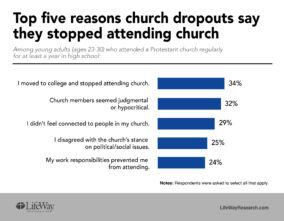A new study from LifeWay has found that the number of young people who go to church drops significantly once teens reach their college-age years.
“The reality is that Protestant churches continue to see the new generation walk away as young adults. Regardless of any external factors, the Protestant church is slowly shrinking from within,” says Scott McConnell, executive director of LifeWay Research.
LifeWay surveyed teens who had attended a Protestant church for a year or more during high school. When asked if they stopped regularly attending church (defined as twice a month or more) for at least a year during the ages of 18 and 22, 66 percent of teens said “Yes,” and 34 percent said “No.”
Not the Reasons You Might Think
The main reasons why young people changed their churchgoing habits had nothing to do with a crisis of faith or seriously disagreeing with core church beliefs. Rather, the majority (34 percent) of young adults stopped attending church consistently simply because their situations changed—that is, they started going to college. The next most common reason at 32 percent was that people in church were hypocritical or judgmental. Twenty-nine percent of young people listed a lack of connection at church as their reason for leaving, and 25 percent cited not agreeing with their churches on social or political topics.

Says McConnell, “Most of the reasons young adults leave the church reflect shifting personal priorities and changes in their own habits. Even when churches have faithfully communicated their beliefs through words and actions, not every teenager who attends embraces or prioritizes those beliefs.”
What were the reasons teens gave for why they attended church regularly at one point? Fifty-six percent said they did so because they saw church attendance as important to their relationship with God. Other reasons included a desire to receive guidance from the church, as well as the influence of their families.
So what does church attendance look like now for those who previously “dropped out” for a year? Twenty-nine percent say they do not currently go to church. Thirty-nine percent go once a month or less, and 31 percent go at least twice a month.
Notably, LifeWay did a similar study in 2007 and found that the dropout rate at the time was 70 percent, which is higher than it is now. While this shows that Protestant churches are not losing more students now than they have in the past, it does not necessarily demonstrate that churches are making meaningful progress when it comes to retaining students.
So how can churches make a better impact? Barna recently did a study on the next generation to follow Millennials, Gen Z, whom Barna defines as anyone born between 1999 and 2015. The study, however, only evaluated young people between the ages of 13 and 18. While this research doesn’t look at church attendance specifically, it does speak to what church leaders can do to disciple young people effectively.
Barna’s research found that today’s young people are prioritizing their careers and financial security. Consequently, Barna recommends that when discipling teens and young adults, churches would do well to educate “young people about the integration of faith and occupation, helping them to better understand the concept of calling and emphasizing the meaning and theological significance of work (not just their potential for professional or financial success).”
Jonathan Morrow of Impact 360, who has worked with Christian teens for 15 years, emphasizes the importance of educating teenagers on the reasons why Christianity is true, which includes giving them space to doubt well. He also believes it’s important to teach teens good habits for living out their faith and that it’s crucial to develop good relationships with them. He says, “I am convinced that relationships are the most powerful shaping influence during the teenage years.”
This advice could be key to helping young people continue to attend church, especially given the number of teens who mentioned lack of connection and hypocrisy as reasons why they stopped going.


